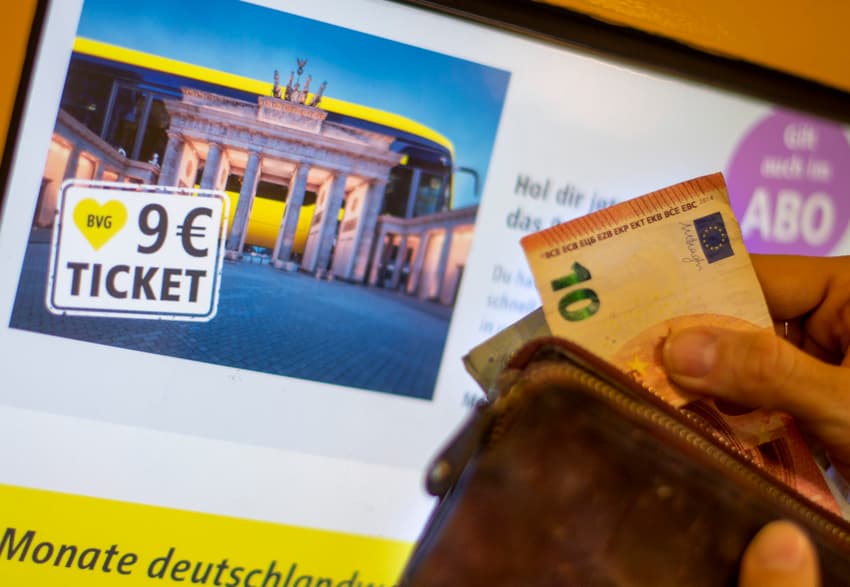German inflation slows in June as government steps in

German inflation slowed slightly in June, official figures published Wednesday showed, as government measures to ease the pressure on consumers from rising prices took force.
Inflation sat at 7.6 percent in June, according to the federal statistics office Destatis, still well above the two-percent target set by central banks but down from 7.9 percent in May.
Consumer prices in Germany have been on an almost constant climb for 18 months, with the last fall in the rate registered in January this year.
Inflation was first stoked by the disruptions arising from the coronavirus pandemic, and then by the war in Ukraine.
Russia's invasion had caused "prices for energy to climb markedly", leading to high rates of inflation, Destatis said.
Year-on-year energy costs were up 38 percent in June, according to the statistics body, while prices for food also increased by 12.7 percent in the same timeframe.
The disruption caused to supply chains by the war and the pandemic also added to price pressures, it said.
The upwards momentum was only broken by government moves to ease the pressure on consumers, including a discounted fuel tax and a flat-rate €9 monthly ticket for public transport.
READ ALSO: How is Germany's €9 ticket really affecting public transport
The full impact of these measures could "not be assessed" in the preliminary data, Destatis said.
"This is not yet the end of surging inflation rates," said Carsten Brzeski, head of macro at the ING bank.
Rather, it was an example that it is "currently governments, not central banks, that can stop inflation", he said.
Despite the relief for consumers from the government on the costs of transport and energy, "food price inflation continued to pick up" while prices were also marked up for services, Brzeski said.
Looking ahead, the government's measures are set to expire at the end of August, while "the potential end to Russian gas for Germany is also likely to increase energy prices going into the winter season", he said.
Spanish inflation reached double digits in June, coming in at 10.2 percent, according to figures published earlier Wednesday.
The data suggested "eurozone inflation is moving up and not down like German inflation", adding to the pressure on the European Central Bank, Brzeski said.
Comments
See Also
Inflation sat at 7.6 percent in June, according to the federal statistics office Destatis, still well above the two-percent target set by central banks but down from 7.9 percent in May.
Consumer prices in Germany have been on an almost constant climb for 18 months, with the last fall in the rate registered in January this year.
Inflation was first stoked by the disruptions arising from the coronavirus pandemic, and then by the war in Ukraine.
Russia's invasion had caused "prices for energy to climb markedly", leading to high rates of inflation, Destatis said.
Year-on-year energy costs were up 38 percent in June, according to the statistics body, while prices for food also increased by 12.7 percent in the same timeframe.
The disruption caused to supply chains by the war and the pandemic also added to price pressures, it said.
The upwards momentum was only broken by government moves to ease the pressure on consumers, including a discounted fuel tax and a flat-rate €9 monthly ticket for public transport.
READ ALSO: How is Germany's €9 ticket really affecting public transport
The full impact of these measures could "not be assessed" in the preliminary data, Destatis said.
"This is not yet the end of surging inflation rates," said Carsten Brzeski, head of macro at the ING bank.
Rather, it was an example that it is "currently governments, not central banks, that can stop inflation", he said.
Despite the relief for consumers from the government on the costs of transport and energy, "food price inflation continued to pick up" while prices were also marked up for services, Brzeski said.
Looking ahead, the government's measures are set to expire at the end of August, while "the potential end to Russian gas for Germany is also likely to increase energy prices going into the winter season", he said.
Spanish inflation reached double digits in June, coming in at 10.2 percent, according to figures published earlier Wednesday.
The data suggested "eurozone inflation is moving up and not down like German inflation", adding to the pressure on the European Central Bank, Brzeski said.
Join the conversation in our comments section below. Share your own views and experience and if you have a question or suggestion for our journalists then email us at [email protected].
Please keep comments civil, constructive and on topic – and make sure to read our terms of use before getting involved.
Please log in here to leave a comment.